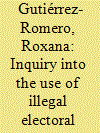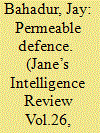| Srl | Item |
| 1 |
ID:
135276


|
|
|
|
|
| Summary/Abstract |
Whilst the middle class are often heralded as forerunners for consolidating democracy, the experiences of Kikuyu in Kenya's 2013 election reveal how under-problematised the socio-economic group is for understanding the pressures faced in voting. The article presents evidence from diary entries of young middle class Kikuyu residing in Nairobi who recorded their feelings and impressions across a period of one month surrounding the country's elections. The diary writers describe the key moments at which they felt the need to switch from supporting third-placed presidential hopefuls to supporting one of the two favourites. Topics felt to pressure voters most keenly were ethnicity, social media, debate surrounding the International Criminal Court and the lack of confidence in others of the middle class. Unlike election analyses which assume static preferences and voting blocks, this methodology allows exploration of the ongoing negotiations and deliberations that influence voting intentions over time. The tensions felt by middle class Kikuyu during the election period made them wish they were members of either of the two other classes, who were in turn viewed as able to influence politics through money or popular power. These feelings of disempowerment ensured voting attitudes fell closely in line with ethnic affiliations, despite members of the middle class remaining wholly dissatisfied with ethnic labelling throughout. It is argued that the economic autonomy of middle class voters did not help disengage them from political tribalism in assessing how to vote.
|
|
|
|
|
|
|
|
|
|
|
|
|
|
|
|
| 2 |
ID:
134946


|
|
|
|
|
| Summary/Abstract |
This article investigates whether vote-buying and the instigation of violence in the disputed 2007 Kenyan elections were strategically motivated and whether those affected by vote-buying or post-electoral violence changed their views toward ethnopolitics and the use of violence. To answer these questions, a panel survey conducted before and after the elections is combined with external indicators of electoral violence. We find that vote-buying was used to mobilize parties’ own strongholds. Political parties also targeted vote-buying and threats toward specific ethnic groups and areas, potentially to weaken the support of their political rivals. In addition, we find that the victims of post-electoral violence are more likely to identify in ethnic terms and support the use of violence. The non-victims of post-electoral violence, but who experienced vote-buying after our first survey are also more likely to support the use of violence.
|
|
|
|
|
|
|
|
|
|
|
|
|
|
|
|
| 3 |
ID:
137006


|
|
|
|
|
| Summary/Abstract |
Colonial legal historiography has tended to focus on customary tribunals rather than ‘European’ courts. This article offers a new vantage point from which to view Kenya’s legal system by looking at colonial judges through the eyes of the trial lawyers who appeared before them. By the late 1950s, Asian lawyers were numerically superior to Europeans and there was only a handful of African advocates. The focus of this article is these advocates’ day-to-day court experiences, and their assessment of individual judges’ competence, roles and attitudes. Their oral testimony adds to our understanding of the function of Kenya’s superior courts and the characters and outlook of the judges and lawyers who staffed them.
|
|
|
|
|
|
|
|
|
|
|
|
|
|
|
|
| 4 |
ID:
135698


|
|
|
|
|
| Summary/Abstract |
Although officially closed, the Kenya-Somalia border remains permeable to Harakat al-Shabaab al-Mujahideen militants and smugglers, with corruption among Kenyan officials and security forces undermining Kenya’s security.
|
|
|
|
|
|
|
|
|
|
|
|
|
|
|
|
| 5 |
ID:
134478


|
|
|
|
|
| Summary/Abstract |
Islamist extremism through al-Shabaab is increasing its foothold in Kenya. In contrast to the common perception—as depicted through government responses—radicalization and recruitment extends well beyond Somali and Kenyan–Somali nationals. Instead of exclusively focusing on external or environmental factors, the study on which this article is based analyzed the personal background of those being radicalized. This article will focus on the role the family and peers play in the political socialization process while analyzing factors influencing radicalization, most notably religious identity, economic, political, and educational background of al-Shabaab members. Based on interviews with al-Shabaab and family members the last part of the article evaluates when, why, and how respondents joined al-Shabaab. Through answering these key questions the Kenyan government and other agencies assisting in preventing radicalization can develop more effective counterradicalization and counterterrorism strategies based on empirical evidence
|
|
|
|
|
|
|
|
|
|
|
|
|
|
|
|
| 6 |
ID:
136092


|
|
|
|
|
| Summary/Abstract |
Focusing on livestock raiding, a major form of violence in arid and semiarid regions, we evaluate the relationship between rainfall and intensity of violence, disaggregating ethnic groups that have somewhat different subsistence patterns. We do so to try to resolve previously published results and conclusions that appear contradictory – some research finding livestock violence higher in wet times suggestive of more violence in times of plenty; others finding violence higher in dry times suggestive of greater scarcity. Using rainfall from NASA and violence data from ACLED for the years 1998–2009, we looked at the patterns of livestock-related violence for six different ethnic groups that have a home in the area in and around Marsabit district of Kenya. Different ethnic groups appear to have somewhat different patterns and we suggest how some of their cultural differences may explain these patterns. However, for most groups, intense violence is more common in drier times.
|
|
|
|
|
|
|
|
|
|
|
|
|
|
|
|